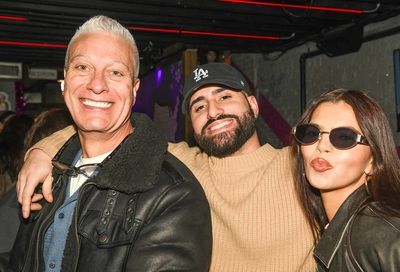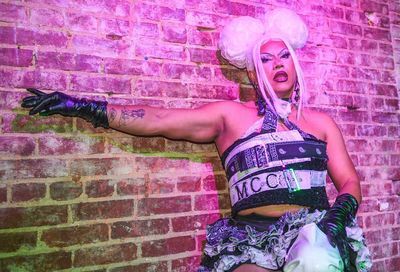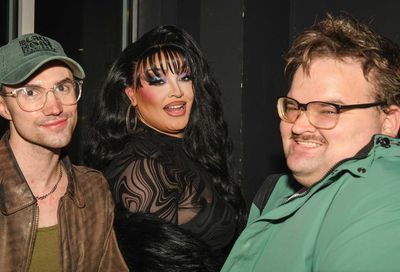Life of the Party
David Dillon's 'Party' at Church Street Theatre
IT’S WEDNESDAY EVENING, July 3, and the cast of Party amble into the the Church Street Theatre. On this particular evening, midway into the hit show’s summer run, some changes are in store — lanky goateed Brian Bickerstaff, who normally plays the role of Peter, has taken a week’s leave and has been replaced by Michael Buie, who usually plays the adorable gay neophyte Andy. Taking Buie’s place is David Turan, a fresh-faced man whose youthful countenance belies his 30 years.
Buie hands Turan a pink envelope. Inside is a card offering words of encourage Turan smiles.
”I only auditioned last clearly nervous. I haven’t had all that much time to prepare.”
Is he a professional?
Turan shudders. He laughs nervously.
”I will be after tonight.”
 |
Four days later, at Saturday’s 6:3) PM show, Turan is giving a performance of enormous grace and self-assurance. It’s hard taken his clothes off—with six other men — in a theater filled with strangers.
But that’s more a testament to David Dillon’s comedy, which has the air of a casual, carefree get-together between good friends. Turan’s with ”friends” up there. At a party And so, in effect, is the audience,
There’s the host, Kevin, and his best friend, Ray, a Catholic priest. There’s easy-go-lucky Philip, buff leather man James, and Broadway chorus boy Brian. There’s new kid on the block Andy, and Peter, Kevin’s young roommate.
Together, they embark on a revealing game called ”Facts and Fantasies,” in which secrets are disclosed, emotions laid bare, love sparked, and — oh, yes — clothes shed. But Party isn’t a sleazefest — it’s no ”Seven Gay Characters in Search of a Dildo.” Rather, it’s an acid-free Boys in the Band for the ’90s, an endearing, sweetly affirming, make-you-laugh-till-your-belly-aches show. It’s as gay positive as they come — even more so than Paul Rudnik’s Jeffrey. Unlike the despondent yet brilliant works of Terrence McNally, Party doesn’t search for deep meaning in gay relationships. Unlike Tony Kushner’s epic and thematically cluttered Angels In America, it doesn’t seek to philosophically analyze the various darknesses that gays face.
It is a gay stage sitcom, and it wants to accomplish two things and two things only: Make us laugh (which it does) and make us remember that life can still be gay.
DAVID DILLON HAD spent the majority of his career as a producer and director. And in summer of 1992, a small Chicago theatre company asked him to direct a gay- themed play for the theatre’s late night slot. He had carte blanche. ”Choose your own script,” they said.
”So I started reading plays that had been submitted to the theatre from all over the country.” recalls the 39-year-old playwright. ”Tread forty scripts in one week. And I noticed something interesting: Every single one of them dealt, in one way or another, with how painful and difficult it is to be gay. In every play, there was something about being gay that made the character’s lives miserable. If it wasn’t illness, death, or dying, it was homophobia or bashing, coming out angst, spousal abuse, or sleazy compulsive sex.
”There was no statement being made by anybody that— despite all of the difficult things we have to deal with—it’s still fabulous to be gay.”
So instead of directing someone else’s work, Dillon chose to take a shot at writing his own play, something ”representative of what my view of being gay is, something reminiscent of the feelings that I used to feel during the five years I was out before anybody ever heard of AIDs.”
For inspiration, Difion used a party he’d attended in early 1992,where a group of friends played Truth or Dare. And yes, says Dillon, ”everybody wound up naked, but nothing sexual happened—it didn’t lead to an orgy We were naked out of a sense of celebration.”
Party opened in Chicago in November, 1992. It was supposed to run six weeks, two nights a week, in the late night slot. It ran over two years. In prime time. To date, productions have been mounted in New York (where it played to packed houses for a year), Los Angeles, Detroit, Miami, Toronto, San Francisco, and now, Washington.
”PEOPLE ASK ME WHY the nudity exists in party” says Dillon, a man for whom a single questions brings forth 1,000 elucidating words. ”Well, any celebration of gay life for me has to include some nod to sexuality And I wouldn’t have the characters have sex onstage, of course. But nudity is as close as I can get to a celebration of sexuality.
”But I’m not stupid,” he continues. ”I know that [the nudity is why a lot of people come to see the play. And I don’t mind that that’s what brings them in. Because I know that they’ll leave with something else.”
”We made a concerted effort to downplay the nudity,” explains director Jeff Keenan, a large, boyish 26-year-old with neatly-cropped peroxide blond hair and a reddish brown goatee. ”This show could have been staged where everywhere you look, you were confronted with a penis, or with flesh. But our nudity is more organic than that. When you finally get to the end, you realize the characters are all naked without being too much of an affront to anybody. We wanted to make this a theatrical experience that happens to involve nudity as opposed to nudity that happens to be surrounded by lights and a set.”
Part of the reason the nudity is absorbed by the show so well is that the cast seems so comfortable with it. It wasn’t always that way.
”The first several rehearsals were nightmares for me,” recalls Brent Wiffiam who plays the queeny, sensually-charged Brian. ”I’m not comfortable with [showing my genitalia. In fact, I’ve never had a physical because I never wanted the doctor to see me naked.”
The 25-year-old actor says he got past his gymnophobia by concentrating on the fact that his ”character loves sexuality and loves being naked.”
Jeff Lofton, who plays Ray, was also nervous about being seen naked at first. ”I was terrified, actually,” he says in a sweet-as-molasses Southern drawl. ”I’ve always been extremely shy and never really thought I had all that great a body.
”But,” he smiles proudly, ”through this experience, I’ve come to realize I’m very fortunate: I have a healthy body and it works.”
He lowers his voice to a whisper. ”You know, I used to have certain ideas about actors who did work that included nudity I guess you could call me a prude. But I don’t have those ideas anymore. I realized that those actors are not good people or bad people simply because they took their clothes off. It’s just part of the work. Being naked on stage has liberated my thinking.”
Surely one would think Heinie Lund, who plays James, and who is well known for his ”exhibitionism” in Rehoboth, had no problem with being naked in front of strangers. Wrong.
”It is a little embarrassing,” he says. ”When you dance, you’re in a G-string, so there’s always a bit that’s hidden. Here, it’s all hanging out.”
Lund says he was less nervous about showing his penis than the manner in which it’s first seen by the audience, a surprise he doesn’t want to spoil for those who haven’t seen the show.
”I dare anyone to stand in front of a mirror and watch themselves do what I do in front of 125 people a night!” he says, turning beet red.
”People often ask ‘Why is there so much nudity in gay plays?”’ says Dillon. ”Well, I think it’s because gay men comprise the segment of the population that’s the most honest about sex. There can be healthy nudity and then there can be smarmy nudity— and both are okay. But I get upset when people constantly attach the smarmy connotation to nudity no matter what the situation.”
Dillon keeps a tight reign over his McParty franchise — and his contract allows him approval of both cast and director.
”I had a terrible experience when I let the show be done in a city where I didn’t go in for the casting and didn’t talk to the director first,” he recalls. ”They did it totally on their own. And then they invited me to come and see it. It was horribly sleazy. The character of Ray looked as if he had been directed to be a child molester. And they staged the very end of the show to [make it seem like] now the orgy’s gonna start.
”Things like that disturb me a lot. Because that’s not what this play is. If you’re doing The Odd Couple, you can’t really flick up [Neil] Simon’s intentions. But there’s the potential in this play for somebody to make it really sleazy. And that’s not what I wrote.
”I promise,” he says with Scarlet O’Haraian determination, ”that I will, at some point in my life, write something that cannot be twisted into something sleazy!”
”WHEN DAVID DILLON SPOKE TO US BEFORE the rehearsal process,” says Joseph Cronin, who plays Kevin, ”he said that two characters were based on himself: One was Kevin — the serious side of him — and the other was Ray.”
In other productions of Party, Ray is the show’s ”star.” And why not? He’s got the funniest lines. He’s got the most comedic flexibility as a character. And he’s a Catholic priest.
”I have problems with Ray,” says Lofton, a Southern Baptist, of the character he portrays. ”Early in the show, Ray says he doesn’t always agree with the church’s official position on things but goes along with them anyway. That’s so hypocritical. I would never be able to live my life or compromise my feelings and views to conform to some larger institution.”
Lofton’s performance is one of perfectly aimed arch camp. His Ray is slightly effeminate, but also has a rich, deep humanity — best depicted in a monologue that explains why he became a priest. Lofton doesn’t steal the show — he works as part of the unit — but he does have the evening’s most priceless bits, such as one where he hilariously berates Andy for not knowing who ”Barbra” is.
Dillon claims he made the character of Ray a priest because he ”wanted to make a statement that there are an awful lot of gay priests out there — and they are not all running after their altar boys.
”There are responsible, caring individuals who are wonderful caregivers and are teachers and who are very, very dedicated. I thought that could be said in a very positive way. I think not only should the Catholic Church admit that there are gay priests within their ranks, I think that they should celebrate that there are gay priests within their ranks. Because I think gay men make better priests.”
In the New York, Los Angeles, and Miami production of the show, the role was played by Ted Bales, who Difion says is ”my dream Ray.” Brent Williams, who also played the role of Brian in the Miami production, is remarkably frank about that experience.
”We were told to do our parts to make Ted look funny, make it Ray’s story,” he says. ”It probably made the show funnier, but it didn’t look like real people on stage. It looked like little puppets running around.
”This production is different. Instead of one person’s story, this show is everyone’s story— it’s about their party. It’s not about Ray’s party at Kevin’s house.”
”THEY TALK ABOUT BEING IN a moment,” Joseph Cronin smiles. ‘And I think right now we’re on a roll. It’s a good moment with this play.
”It’s an incredible high to be involved in a show that’s having such a successful run,” marvels Lund, who gave up a summer at Rehoboth Beach with his lover of nine years, Chris Riss. ”I miss the Blue Moon and my friends down there. But I don’t miss the beach. It’s been there for years, and it will be there next year. This is an opportunity that I’ve never thought I’d ever have. And I’m glad I took it.”
”It’s nice to be part of a happy play about gays,” proclaims Michael Buie. ”Because I was so ghastly unhappy for so much of my life because I knew I was gay.”
Adds Scott Sophos, who plays Philip: ”This show doesn’t dwell on the negative. And I think it changes people’s lives just by the enjoyment they have at seeing positive gay role models on stage having fun.
”Jeff Keenan mentioned something to me the other day. He said when people come up to the theatre before the show, they’d walkup the opposite side of the street until they get to the theatre, and then they walk in. But when they leave, they’re walking down the middle of the road back to 17th Street. It’s like they’ve been empowered by seeing these gay men having such a good time.”
Kinda like leaving a really swell Party.
Support Metro Weekly’s Journalism
These are challenging times for news organizations. And yet it’s crucial we stay active and provide vital resources and information to both our local readers and the world. So won’t you please take a moment and consider supporting Metro Weekly with a membership? For as little as $5 a month, you can help ensure Metro Weekly magazine and MetroWeekly.com remain free, viable resources as we provide the best, most diverse, culturally-resonant LGBTQ coverage in both the D.C. region and around the world. Memberships come with exclusive perks and discounts, your own personal digital delivery of each week’s magazine (and an archive), access to our Member's Lounge when it launches this fall, and exclusive members-only items like Metro Weekly Membership Mugs and Tote Bags! Check out all our membership levels here and please join us today!


























